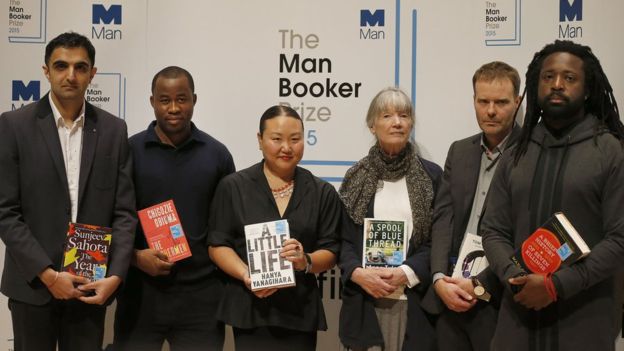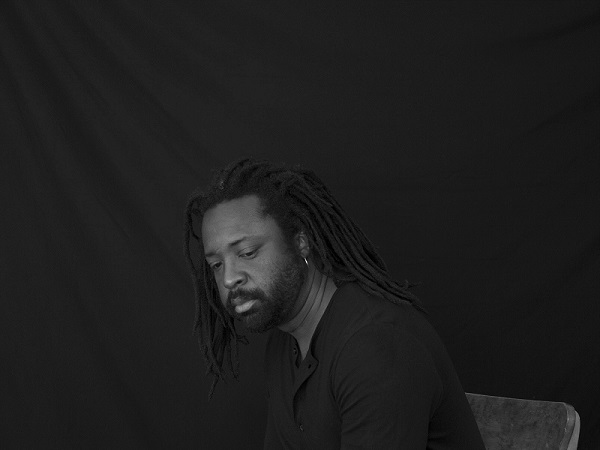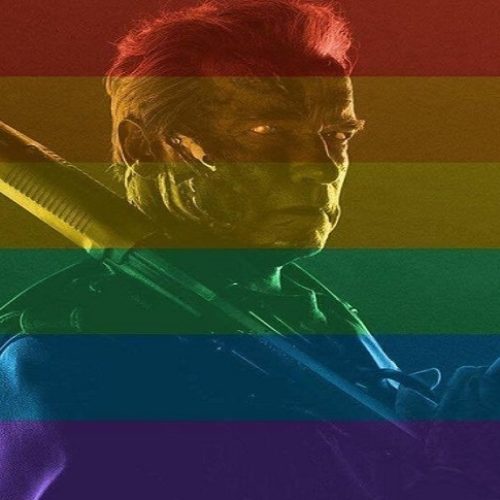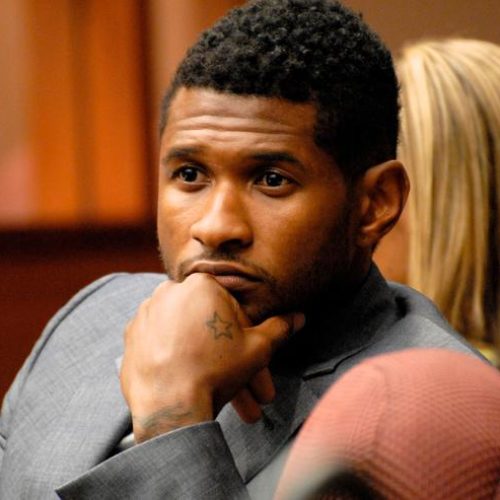Marlon James’ Journey To Self Discovery
Jamaican author Marlon James has won the Man Booker Prize for his novel, A Brief History of Seven Killings, inspired by the attempted assassination of Bob Marley in the 1970s. James was announced the £50,000 winner on Tuesday night at London’s Guildhall.
Michael Wood, chair of the judges, described James’ book as the “most exciting” book on the shortlist. The 680-page epic was “full of surprises” as well as being “very violent” and “full of swearing”. This year’s shortlisted authors: (from left) Sunjeev Sahota, Chigozie Obioma, Hanya Yanagihara, Anne Tyler, Tom McCarthy and Marlon James
This year’s shortlisted authors: (from left) Sunjeev Sahota, Chigozie Obioma, Hanya Yanagihara, Anne Tyler, Tom McCarthy and Marlon James
James is the first Jamaican author to win the Man Booker Prize. Receiving the award, he said a huge part of the novel had been inspired by reggae music. “The reggae singers Bob Marley and Peter Tosh were the first to recognise that the voice coming out our mouths was a legitimate voice for fiction and poetry.”
The 44-year-old author admitted it was “so surreal” to win and dedicated the award to his late father who had shaped his “literary sensibilities”.
While acknowledging Marlon James’ victory, it behooved me to share his New York Times publication about self discovery. Titled From Jamaica to Minnesota to Myself, here it is. Read and sound off in the comments section.
*
I had just left my parents’ house in Portmore, a suburb outside Kingston, for my own apartment in the city: a one-bedroom studio, barely 600 square feet, with yellow shag carpeting, a tiny terrace enclosed in jail bars, a bedroom looking out on somebody else’s bedroom and a ceiling I could reach. I locked myself away from the neighbors with two deadbolts.
At 28 years old, seven years out of college, I was so convinced that my voice outed me as a fag that I had stopped speaking to people I didn’t know. The silence left a mark, threw my whole body into a slouch, with a concave chest, as if trying to absorb impact. I’d spent seven years in an all-boys school: 2,000 adolescents in the same khaki uniforms striking hunting poses, stalking lunchrooms, classrooms, changing rooms, looking for boys who didn’t fit in. I bought myself protection by cursing, locking my lisp behind gritted teeth, folding away my limp wrist and drawing 36-double-D girls for art class. I took a copy of Penthouse to school to score cool points, but the other boys called me “batty boy” anyway — every day, five days a week. To save my older, cooler brother, I pretended we weren’t related. At home, I lost myself in Dickens’s London, Huck Finn’s Mississippi River or Professor Xavier’s School for Gifted Youngsters. One day after school, instead of going home, I walked for miles, all the way down to Kingston Harbor. I stopped right at the edge of the dock, thinking next time I would just keep walking.
The University of the West Indies was a door: wide open. I found friends who seemed to have been waiting all summer for me to show up. I walked into the library with a back issue of Spin, and somebody asked if that was the one with Tom Waits. I’d known people who were geeky, sarcastic, well versed in the Smiths and “The Wrath of Khan,” but they had never been my friends before. Now I was dragged into word wars because one friend said “Time Bandits” was the greatest movie ever, when everybody knew it was “Life of Brian.” There were cheap liquor, potato chips, ironic quips, mix tapes. But when college ended, I returned home, got a job in advertising and shut myself down again. The people I had left behind were waiting for me when I got back.
The entrance to my cubicle was blocked by a boss with curious eyebrows who asked why all my magazines showed men on the covers, what GQ meant, where was Playboy. Every man in the office had a woman on the side, whether he was married or not, and even monogamous men were considered gay. Memories of childhood returned as nightmares: I was a kid again, frightened by school, praying to God every night, please let me wake up in another body. One that walked and talked right. That did not play house with a boy in the neighborhood that time when he was 8 and I was 9 and ruin him and myself.
One day I bought “Steppenwolf,” by Hermann Hesse, in a bookstore. Early in the book, an irrefutable argument for suicide jumped out and grabbed me by the neck: the scene in which the protagonist, having given himself his own expiration date, realizes that he can put up with anything, tolerate everything, suffer through all things because he knows when he’s going to check out. I hadn’t thought about killing myself since I was 16. But now there were nights when I woke up crying, or found myself out on the jail-terrace sunk so low into sadness that I had no memory of how I got there. I listened over and over again to lyrics from the song “I Found a Reason,” by the Velvet Underground: “I do believe/If you don’t like things you leave.” I cried for a sorrow that I did not know I had.
I was 28 years old, and I’d reached the end of myself. Electric words, “end of yourself” — I first heard them during a sermon in a Kingston church. The preacher was talking about when you reached the limits of your own wisdom and the only person left with any answers was God. A new friend in the office, who went to school in Canada and came in as my assistant, read my sarcasm as a defense tactic, though he didn’t know the reason, and said, “You should come to church this Sunday.” By then I was having panic attacks. I went to a doctor and asked, “Am I normal?” He said normal was a scale, with the left being normal and the right being abnormal, and I was somewhere on the left side of the middle. Then he gave me Xanax and asked if I wanted Prozac. Instead I got saved.
The church was called a clap-hands congregation, meaning charismatic, except it was full of upper-middle-class folk, and a cool pastor who drove a sports car. One Wednesday night, while Pastor was telling us that blessings were five miles upstream so we should, like Enoch, wait on the Lord, I started reading Salman Rushdie’s “Shame,” hiding it in the leather Bible case. I had never read anything like it. It was like a hand grenade inside a tulip. Its prose was so audacious, its reality so unhinged, that you didn’t see at first how pointedly political and just plain furious it was. It made me realize that the present was something I could write my way out of. And so I started writing for the first time since college, but kept it quiet because none of it was holy. I stayed in church for nearly nine years, telling a woman I tried to date that the real reason I had no interest in a relationship was Jesus. In 2005, when I was 34, I published my first novel, “John Crow’s Devil,” and wrote myself all the way to a book tour of the United States.
I stepped off the 6 train at Spring Street. Black combat boots busting a move. The phrase is nearly 20 years old, true, but I claimed it because I needed it, never more than right then. Levi’s Offender jeans sausaging my legs skinny; hip hug, butt squeeze, flaring below the knee and over my boots. Blue Stereolab T-shirt that stopped above the belt, Calvin Klein shades bought cheap at Century 21. Stepping out of the subway, emerging crotch first, posture moving from a slump like a question mark to a buffalo stance, an exclamation point. Walking to where Spring hits Broadway, the sexiest junction in all America, I’d heard. Where modeling agencies look down on modeling hopefuls strutting like peacocks.
Anonymity was a sea to dive into. Stonewall was a club to pass by — I was years away from having the guts to go in. Besides, I had no friends. In store windows, I saw a person who took me by surprise at first. The Strand Book Store, Tower Records, Other Music, Shakespeare & Co.; each was a step further away from the self I had left behind in another country.
It was getting dark, though summer stretches daylight, and I needed to be back in the Bronx. My younger half brother and his mother lived there, on a street of Jamaican immigrants. I walked to Barnes & Noble in Union Square, to the bathroom. I closed the door of the special-needs toilet, the same stall I used seven hours before, pulled my normal clothes out of the backpack and peeled New York off my skin. Back to loose T-shirt. Baggy jeans. Sneakers on my feet, boots in the bag. I took the 5 train home to the Bronx.
In creative writing, I teach that characters arise out of our need for them. By now, the person I created in New York was the only one I wanted to be. Over the next two years, I came and left often, pushing the limits of a student visa. I’d make friends but never get close enough to have them ask me anything too deep, playing at being aloof when I was really just shy, and I’d walk past gay bars, turn and walk past again, but never go in. Back home I fell back into church, knowing I didn’t belong there anymore. Once I forgot to code-switch in time and dashed to the bathroom in J.F.K., minutes before my flight to Kingston, to change out of my skinny jeans and hoop earrings. Eight years after reaching the end of myself, I was on borrowed time. Whether it was in a plane or a coffin, I knew I had to get out of Jamaica.
Then the college called. Macalester, in St. Paul, Minnesota. They liked my application letter, résumé and first novel and wanted to interview me. Minnesota, though. My entire knowledge of that state came from Prince’s movie “Purple Rain.” Everyone I asked said only: “It’s cold.” In January, I flew to the U.S. for an interview, then back to Jamaica, and waited, trying to feel nothing, just to keep from being disappointed. In March, Macalester sent an email. A one-year teaching job, full time. I packed up my entire life — my books — to ship to the States. It may have been only a one-year contract, but I was never going back. I felt no emotion. I didn’t see anything of Minnesota until the day I showed up for work.
I was shocked by my empty apartment, thinking “empty” meant a few chairs and a couch. I bought an air bed from Target. Seven days in, I put on jogging shoes and didn’t stop running until I saw something I liked, the downtown Minneapolis skyline. For a man always fearing what people thought, I was suspicious of “Minnesota nice,” everybody smiling and saying hello while they kept walking. But by the end of the first week, somebody I’d just met gave me a bicycle to get around; someone else bought me coffee mugs. Another professor, Casey, who moved here to teach as well, was into the band My Bloody Valentine and “Project Runway.” We became friends in 36 hours. In less than a year, I moved out of school housing to my first real apartment, and a young man who was my neighbor knocked on my door, asking, “Hey, you wanna smoke a bowl with us?” His name was Alex, and his friend across the landing was John-John. Two handsome straight boys who adopted me and became partners in finding me a life, mostly by getting me drunk at the Irish bar up the road.
I had never set foot in a gay bar without paranoia pushing me back out. During Gay Pride week, Alex and John-John dragged me to one called Camp, which was decorated with disco balls and drawings of octopus tentacles. Alex dressed as a cowboy, John-John as Travolta in “Saturday Night Fever,” both addressing themselves to people who hadn’t asked as my “bitches.” I was almost a cowboy, with a western shirt, vest and boot-cut jeans. I wasn’t quite sure what was supposed to happen, and neither were they, so we just drank.
Three years later, my best friend, Ingrid, visited from Jamaica. She looked at my walls, covered with photos and posters, books all the way to the ceiling, four shelves of vinyl, copies of GQ, Bookforum and Out magazines scattered everywhere, my “simile is like a metaphor” T-shirt, then at my face and said: “This is so you, dude. I’ve never seen you as you before.” I didn’t even realize when it happened, when I stopped playing roles. I wore my New York clothes to class, on the street, to clubs. Nobody cared that my jeans had a nine-inch rise. I no longer looked over my shoulder in the dark.
Marlon James is the author of three novels, “John Crow’s Devil,” “The Book of Night Women” and, most recently, “A Brief History of Seven Killings.” He lives in Minnesota.
About author
You might also like
The Perfect Response Arnold Schwarzenegger Gave A Homophobic Troll
On Friday afternoon, it was revealed that America had finally ruled that every single state in the country would allow same-sex marriage because, y’know, #LoveWins. As a result of the
Usher’s male accuser claims singer exposed him to herpes at Koreatown spa
The man accusing Usher of exposing him to herpes claims the two had sex at a spa in Los Angeles. This man, who is unidentified, alleges that the pair had
Kristen Stewart Talks About Her Sexual Orientation, Says She’s Not Hiding
“Google me, I’m not hiding… If you feel like you really want to define yourself, and you have the ability to articulate those parameters and that in itself defines you,










24 Comments
Mandy
October 15, 06:22Wait, there’s a Nigerian in the Man Booker Prize shortlist? Nice.
Dennis Macaulay
October 15, 06:26And it was his debut novel oo! I was beaming with pride and started stalking the guy on social media.
I have ordered my copy of the book!
Pink Panther
October 15, 06:56Of the Chigozie book or Marlon’s?
Dennis Macaulay
October 15, 07:04Chigozie Obioma’s Fishermen with Chinelo Okparanta’s “Under the udala trees”.
If I don’t read this two books, I may suddenly pass out
Dennis Macaulay
October 15, 06:24I was rooting for Chigozie Obioma (naturally) so I wasn’t happy when the Jamaican won, but after reading this piece I am beginning to appreciate him.
I know what it is to feel like you don’t belong somewhere! This was quite touching and personal and I loved reading it.
Meanwhile if he finished his first book at 34, I still have hope Na because people like Chubundu Onuzo make some of us feel like there is no hope lol.
ken
October 15, 06:42Wow! I used to think Jamaicans are only famous for their “unnaturally” large cocks.
I guess I was wrong!
Dennis Macaulay
October 15, 07:06Oh chimo!
Size of cock is now determined by nationality/ethnicity? I thought mother nature decided such things?
belcullen
October 15, 07:57Blacks re known 4 dia big cocks nah Dennis
ikhines
October 15, 07:57Thought so too until I started watching asian porn.
Oluwadamilare Okoro
October 15, 07:30Hmmmm.
I think what I took from this is his “want” to be better, to be himself …. Eventually from playing roles, he just came naturally.
Maybe if we can stop focusing all our efforts on seeming straight rather on being our own true selves … We will have more self accepting gay(everybody covered by the acronym, LGTB) people.
Brian Collins
October 15, 08:09‘Eventually from playing roles, he just came naturally.’
The only thing i saw in this comment was this and so many evil things came to mind. Does anyone else see it?
Duke
October 15, 08:06Any book that could beat “The Fishermen” is worth reading. I stayed up all night reading that book.
poshyydude
October 15, 08:58I love the way Marlon writes and he has inspire to want to read his book
Max
October 15, 09:15This was beautiful. It was long, but it didn’t want it to end. Totally relatable.
Bravo- I’m gonna search amazon book store for his books.
King Mufasa
October 15, 10:47This is the kind of stuff that gets my blood flowing.
I loved every minute spent reading this…
Teflondon
October 15, 11:52Nice read, i enjoyed every bit of this. Not really into reading books that isn’t about making more money, being an Entrepreneur Etc But with guys and books like this i think i will definitely enlarge my scope on/of reading.
This guy however reminds me so much of my very good friend Onyeka, very striking similarities in looks and life story. also a very talented writer and author. watch-out for him soon. check his book ‘The Abyssinian boy’
pete
October 15, 13:18Tef, are you an entrepreneur?
Max
October 15, 15:35I know Onyeka Nwelue and when he’s not busy being a douchebag, he can really write.
Yeah he’s gay alright, thanks Tef for outing him to the entire world.
Jeova Sanctus Unus
October 15, 17:42Tef’s comment neither had his last name nor the word “gay”.
Apology accepted.
Delle
October 15, 12:06Hmmmm…I really hate guys in dreadlocks (not attractive) but I’m going to push that aside for my love of his creativity. Nice writing style dear.
Is he gay? I mean Marlon or did he write about a gay guy? I really have to ask.
Pink Panther
October 15, 13:22He was writing about himself. What do u think
Delle
October 15, 16:05Criosly? What I think? Well I think he should try and not be gay anymore, for starters! Don’t mind me, I’m just being sassy.
Well it was good, that’s all. Why didn’t the Nigerian win though? (Pls don’t gimme that look)
Khaleesi
October 15, 15:24Wow!! an amazing and inspiring story …
Marlon James Working on ‘African Game of Thrones’ | KitoDiaries
December 20, 04:28[…] Booker Prize-winning author recently told Man of the World that he’ll be “geeking the fuck out” for his next book, Black […]